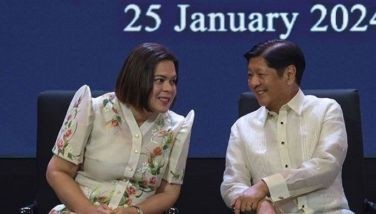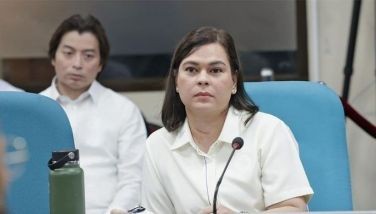Change comes too slow, if at all, at the IMF
March 11, 2001 | 12:00am
After many years of denying that it has its basic policies wrong, is the International Monetary Fund beginning to re-examine the advice it gives to developing countries?
Don’t bet on it yet. But comments made in mid-January by the IMF’s top official, Horst Kohler, show that the powerful institution is now having nagging doubts about the wisdom of some of its most basic principles.
That’s not surprising, since the IMF has come under increasing attack from a wide range of critics, including leaders of developing countries, social groups and movements protesting in the streets, top academic economists (including the World Bank’s former chief economist Joseph Stiglitz) and even conservative American congressmen threatening to reduce their financial support.
The IMF’s policies have little credibility left with the public in both developing and developed countries. And even with the academic or political establishment in the rich countries, there has been a dramatic deterioration in the once-invincible image of this premier international financial institution.
After the German official, Horst Kohler, took over from Michel Camdessus as the IMF’s managing director early last year, there was hope that he would quickly institute some basic changes.
According to news reports, he had started a review of the long list of "policy conditions" that accompany the loans the IMF provides to cash-strapped countries. The conditions cover not only issues regarding finance and the government budget but also ownership of the economy, trade policy, property laws, and other non-economic topics that involve political and social structures.
To be eligible for loans, the government has to agree the conditions. Before each installment of the loan is disbursed, the IMF will have to be satisfied that the policies are being implemented, and that a new "letter of intent" containing conditions is signed.
The wide scope and inappropriateness of the policies have been criticized for years, and the attacks have reached fever pitch after the Asian crisis, when Indonesia, Thailand and South Korea were the new countries subjected to the "IMF medicine."
Kohler’s reported attempt to review the policies was thus as welcome move. But almost a year later, we have yet to hear about any reform in the IMF relating to policy conditionality. If anything, the list of conditions seems to have grown longer.
A major tenet of the IMF Secretariat is that countries should have liberal financial systems that are open to the free flow of various types of funds, into and out of the country. This policy of "capital mobility", or in technical jargon "capital account liberalization," was one of the major pieces of policy advice that the IMF staff, especially Camdessus , pursued with missionary zeal in developing countries.
Such a policy led to too much funds swapping into East Asia, in search of too few good projects. And then the crisis struck and the flow reversed.
Even as money was flowing out by the billions from the affected Asian countries in 1997-1998, Camdessus was insisting that the countries themselves were to blame because they had not liberalized enough. And true enough, a major IMF condition for extending loans was that the crisis-hit countries would keep their economies open to free capital flows, and then open them up even more.
Recently, Kohler seemed to be voicing second thoughts on this policy. Speaking at the Asia-Europe (ASEM) finance ministers’ meeting in Kobe, Japan, he said the benefits of "carefully prepared integration" into the global financial system outweighed the risks.
Kohler said he was requesting the IMF staff to review the experience of country cases to be able to "begin distilling more detailed practical suggestions" on the sequencing of liberalization.
Kohler’ statement may, at first, seem reassuring. On further reflection, it is alarming that it is only now that the IMF is to conduct a review of country experiences and to begin providing detailed suggestions on how to carry out financial liberalization.
This is an implicit admission the IMF’s one-size-fits-all policy that "capital liberalization is good for you" has been wrong. Indeed, in a report of Kohler’s speech, the financial news agency Bloomberg said the comments were an "about-face" for the IMF, compared to its earlier advice to policymakers in emerging markets to throw open their countries’ capital markets.
It is important to realize that many of the policy conditions (attached to the IMF loans to Indonesia, Thailand, South Korea and scores of others) oblige these countries to maintain open capital markets and to open them up further.
If Kohler is serious, then the review process he initiated should also review and change the conditions relating to capital liberalization. At the least, the IMF must allow countries the option to have selective exchange and capital controls, if their countries are not yet prepared to weather the storms of free capital flows, and if there is still no international regulations of such flows.
In the same speech Kohler also admitted that the recent financial crises had led to re-examination of the merits of capital controls. He praised the Chilean measure controlling short-term inflows as a means to prevent debt.
On Malaysia’s measures, he was much more guarded, stating: "In the case of Malaysia, which adopted controls of capital outflows, the evidence is not clear."
He added that in some other countries, the effect of capital controls has been clearly negative and there should be further research to assess the costs and benefits of capital controls in particular circumstances.
Kohler’s speech indicates that the IMF is re-examining a few of the beliefs that previously it considered sacred and unshakable. But it has been more than three years since the Asian crisis broke (and two decades of loans with "structural adjustment) conditions to over 80 developing countries, with few cases of success) and the pace of re-learning at the IMF has been very slow.
Meanwhile, its staff continues to hand out more policy conditions that could very well be like wrong and bad medicine unfortunate enough to have fallen into crisis.
In the past, the IMF has proven to be a powerful and stubborn imposer. Who knows when or whether it will ever change? – Third World Network/IBON Features
Don’t bet on it yet. But comments made in mid-January by the IMF’s top official, Horst Kohler, show that the powerful institution is now having nagging doubts about the wisdom of some of its most basic principles.
That’s not surprising, since the IMF has come under increasing attack from a wide range of critics, including leaders of developing countries, social groups and movements protesting in the streets, top academic economists (including the World Bank’s former chief economist Joseph Stiglitz) and even conservative American congressmen threatening to reduce their financial support.
The IMF’s policies have little credibility left with the public in both developing and developed countries. And even with the academic or political establishment in the rich countries, there has been a dramatic deterioration in the once-invincible image of this premier international financial institution.
After the German official, Horst Kohler, took over from Michel Camdessus as the IMF’s managing director early last year, there was hope that he would quickly institute some basic changes.
According to news reports, he had started a review of the long list of "policy conditions" that accompany the loans the IMF provides to cash-strapped countries. The conditions cover not only issues regarding finance and the government budget but also ownership of the economy, trade policy, property laws, and other non-economic topics that involve political and social structures.
To be eligible for loans, the government has to agree the conditions. Before each installment of the loan is disbursed, the IMF will have to be satisfied that the policies are being implemented, and that a new "letter of intent" containing conditions is signed.
The wide scope and inappropriateness of the policies have been criticized for years, and the attacks have reached fever pitch after the Asian crisis, when Indonesia, Thailand and South Korea were the new countries subjected to the "IMF medicine."
Kohler’s reported attempt to review the policies was thus as welcome move. But almost a year later, we have yet to hear about any reform in the IMF relating to policy conditionality. If anything, the list of conditions seems to have grown longer.
A major tenet of the IMF Secretariat is that countries should have liberal financial systems that are open to the free flow of various types of funds, into and out of the country. This policy of "capital mobility", or in technical jargon "capital account liberalization," was one of the major pieces of policy advice that the IMF staff, especially Camdessus , pursued with missionary zeal in developing countries.
Such a policy led to too much funds swapping into East Asia, in search of too few good projects. And then the crisis struck and the flow reversed.
Even as money was flowing out by the billions from the affected Asian countries in 1997-1998, Camdessus was insisting that the countries themselves were to blame because they had not liberalized enough. And true enough, a major IMF condition for extending loans was that the crisis-hit countries would keep their economies open to free capital flows, and then open them up even more.
Recently, Kohler seemed to be voicing second thoughts on this policy. Speaking at the Asia-Europe (ASEM) finance ministers’ meeting in Kobe, Japan, he said the benefits of "carefully prepared integration" into the global financial system outweighed the risks.
Kohler said he was requesting the IMF staff to review the experience of country cases to be able to "begin distilling more detailed practical suggestions" on the sequencing of liberalization.
Kohler’ statement may, at first, seem reassuring. On further reflection, it is alarming that it is only now that the IMF is to conduct a review of country experiences and to begin providing detailed suggestions on how to carry out financial liberalization.
This is an implicit admission the IMF’s one-size-fits-all policy that "capital liberalization is good for you" has been wrong. Indeed, in a report of Kohler’s speech, the financial news agency Bloomberg said the comments were an "about-face" for the IMF, compared to its earlier advice to policymakers in emerging markets to throw open their countries’ capital markets.
It is important to realize that many of the policy conditions (attached to the IMF loans to Indonesia, Thailand, South Korea and scores of others) oblige these countries to maintain open capital markets and to open them up further.
If Kohler is serious, then the review process he initiated should also review and change the conditions relating to capital liberalization. At the least, the IMF must allow countries the option to have selective exchange and capital controls, if their countries are not yet prepared to weather the storms of free capital flows, and if there is still no international regulations of such flows.
In the same speech Kohler also admitted that the recent financial crises had led to re-examination of the merits of capital controls. He praised the Chilean measure controlling short-term inflows as a means to prevent debt.
On Malaysia’s measures, he was much more guarded, stating: "In the case of Malaysia, which adopted controls of capital outflows, the evidence is not clear."
He added that in some other countries, the effect of capital controls has been clearly negative and there should be further research to assess the costs and benefits of capital controls in particular circumstances.
Kohler’s speech indicates that the IMF is re-examining a few of the beliefs that previously it considered sacred and unshakable. But it has been more than three years since the Asian crisis broke (and two decades of loans with "structural adjustment) conditions to over 80 developing countries, with few cases of success) and the pace of re-learning at the IMF has been very slow.
Meanwhile, its staff continues to hand out more policy conditions that could very well be like wrong and bad medicine unfortunate enough to have fallen into crisis.
In the past, the IMF has proven to be a powerful and stubborn imposer. Who knows when or whether it will ever change? – Third World Network/IBON Features
BrandSpace Articles
<
>
- Latest
- Trending
Trending
Latest





























